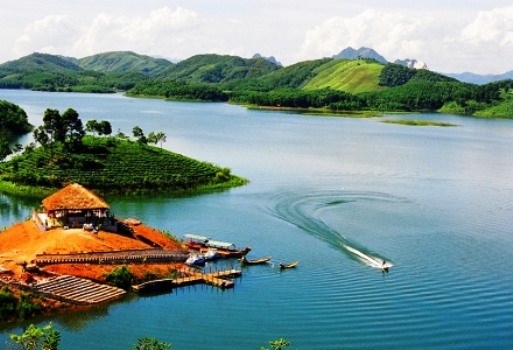
Prime Minister Nguyen Xuan Phuc has approved a master plan on the development of Thac Ba Lake national tourism site in the northern mountainous province of Yen Bai until 2025.
According to the master plan, Thac Ba Lake will become a
national tourism site with 380,000 visitors by 2025 and 1 million by 2030
(Photo: baochinhphu.vn)
The site, located in Yen Binh district and Thac Ba town, will
cover a total area of around 28,800 hectares. About 1,200ha (excluding the area
of the water) will be used to develop the tourism zone.
The plan aims to turn the Thac Ba Lake site into a national tourism hub by
2025.
Over the next five years, the site will develop into an ecotourism, resort and
recreation centre of Yen Bai province and the northern midland and mountainous
area.
The site will take advantage of its lakeside areas, scenic beauty and the
cultural identity of the Chay river to build a brand for tourism products
aligned with approved regional development strategies.
The plan will ensure the area’s tourism sector is in harmony with other
economic sectors and the lake’s other functions to maintain the region’s
ecosystem, mitigate climate change and prevent natural disasters.
The site will develop connections with popular resorts and other tourism
hotspots in Yen Bai and Hanoi.
One focus of the plan is on mobilising local resources and using rural
labourers to help eradicate poverty and promote an economic transformation in
the area.
The plan targets welcoming 380,000 visitors by 2025 and 1 million by 2030.
International arrivals should account for 40,000 and 140,000 of the tourists,
respectively. Accommodations will consist of 600 rooms by the first deadline and
1,000 by the second.
Total tourism revenues are expected to hit 300 billion VND (nearly 13 million
USD) by 2025 and 900 billion VND by 2030. The site will create 1,000 jobs for
local people by 2025 and 2,000 by 2030.
The site will focus on attracting tourists from Hanoi, other provinces in the
Red River Delta, the northeastern coastal and the northern midland and
mountainous region, while also attracting luxury tourists from HCM City, Da
Nang and Can Tho.
Internationally, priority will be given to the traditional markets, including
France, the US and Canada, in addition to expanding reach in Northeast Asian
markets such as China, Japan and the Republic of Korea, and Southeast Asian
nations including Thailand and Laos.
Source: VNA
Located just a 20-minute drive from Hoa Binh City, Ora Hill Farmstay & Glamping Hoa Binh is a captivating new destination nestled in Mo hamlet, Bình Thanh commune, Cao Phong district. Combining farming with leisure, this tranquil retreat is perfect for those seeking balance, joy, and an immersive experience in the expansive beauty of nature.
Muong Bi - Tan Lac is renowned as one of the four famous Muong regions in Hoa Binh province. Blessed by nature with a favourable climate and stunning landscapes, Tan Lac holds great advantages for tourism development. The local tourism industry has made remarkable strides in recent times thanks to the attention and support from the local authorities and sectors.
With its strategic location, well-developed transport network, and diverse soil and climatic conditions, Hoa Binh is emerging as a must-visit destination in Vietnam's northwestern tourism corridor. The province boasts numerous attractions, including the Kim Boi hot springs (Kim Boi district), the Dau Rong cave complex (Cao Phong), the Mai Chau valley (Mai Chau), and the iconic Hoa Binh hydropower plant.
The northern mountainous province of Hoa Binh has been listed among the 71 most beautiful places to visit worldwide by the prestigious US travel magazine Condé Nast Traveller.
Hoa Binh province’s rich natural and cultural resources position it as a prime location for developing community-based tourism (CBT). In recent years, support from central and provincial policies, as well as assistance from non-governmental organisations, have encouraged local ethnic minority and mountainous communities to actively engage in the sector.



